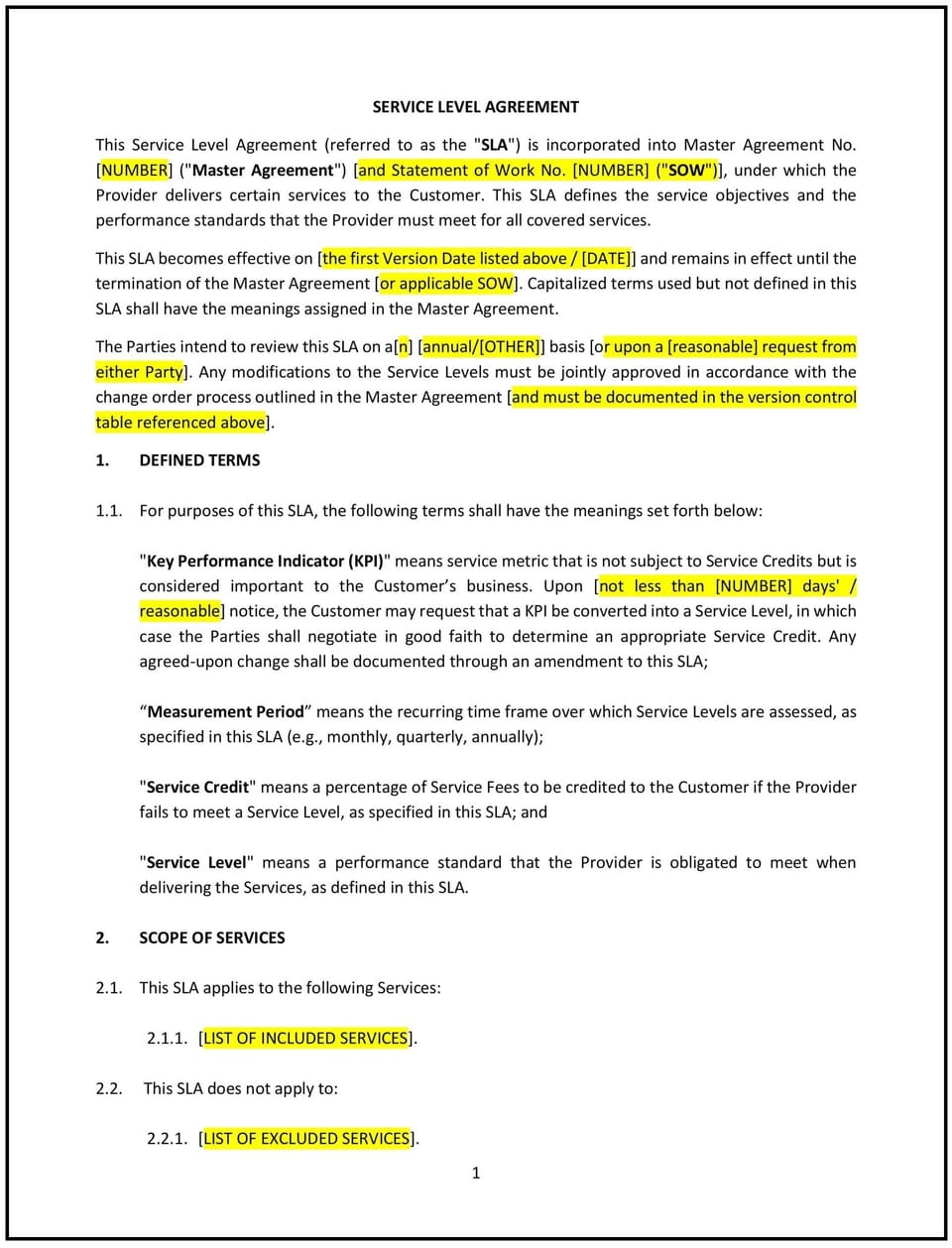Service Level Agreement (SLA) (Rhode Island): Free template

Service Level Agreement (SLA) (Rhode Island)
A Service Level Agreement (SLA) in Rhode Island is a legally enforceable contract that establishes clear service expectations, performance metrics, and responsibilities between a service provider and a client. This agreement is widely used in industries such as IT services, cloud computing, consulting, managed services, and maintenance contracts to ensure reliable service delivery and avoid disputes.
Rhode Island follows general contract law principles in enforcing SLAs. While no state-specific SLA regulations exist, businesses operating in industries such as healthcare, financial services, and telecommunications must comply with applicable federal laws. A well-drafted SLA not only protects business interests but also helps foster trust between service providers and clients by setting clear standards and accountability measures.
Tips for drafting and maintaining a Service Level Agreement in Rhode Island
- Clearly outline the scope of services, specifying what is included and excluded, so there is no confusion about the provider’s responsibilities.
- Establish measurable performance benchmarks, such as system uptime guarantees, response times, and issue resolution deadlines, to ensure service quality.
- Define client obligations, including access to systems, necessary cooperation, and compliance with service requirements, to avoid performance disruptions.
- Specify remedies for service failures, including service credits, refunds, or contract termination rights. Rhode Island law allows businesses to negotiate these terms freely.
- Include a dispute resolution mechanism, detailing whether conflicts will be handled through Rhode Island courts, arbitration, or mediation. Many businesses prefer arbitration for efficiency.
- Address data protection and confidentiality requirements, particularly if the service provider handles sensitive business or customer information. Federal laws may also apply in certain industries.
- Regularly review and update the SLA to reflect technological changes, evolving business needs, and any new legal or regulatory requirements.
Frequently asked questions (FAQs)
Q: What should Rhode Island businesses include in a Service Level Agreement?
A: The agreement should define the scope of services, performance metrics, remedies for service failures, client responsibilities, dispute resolution methods, and termination rights.
Q: How does an SLA help businesses in Rhode Island?
A: An SLA ensures service consistency, provides legal protection, improves accountability, and offers structured solutions for handling service failures or disputes.
Q: Are service credits legally enforceable in Rhode Island SLAs?
A: Yes, as long as they are explicitly included in the contract, service credits can be enforced as a form of compensation for unmet service commitments.
Q: What happens if a service provider fails to meet SLA requirements in Rhode Island?
A: Depending on the agreement, the client may be entitled to service credits, refunds, or contract termination. If necessary, legal action can be taken for severe breaches.
Q: How should Rhode Island businesses resolve SLA-related disputes?
A: The SLA should specify a dispute resolution process, including mediation, arbitration, or litigation in Rhode Island courts, to handle conflicts effectively.
Q: Can verbal SLAs be enforced in Rhode Island?
A: While verbal contracts may be legally binding in some cases, a written SLA provides stronger legal protection and ensures that expectations are clearly defined.
Q: Can an SLA be modified after signing in Rhode Island?
A: Yes, but both parties must agree to any modifications, and changes should be documented in writing to prevent future disputes.
This article contains general legal information and does not contain legal advice. Cobrief is not a law firm or a substitute for an attorney or law firm. The law is complex and changes often. For legal advice, please ask a lawyer.


